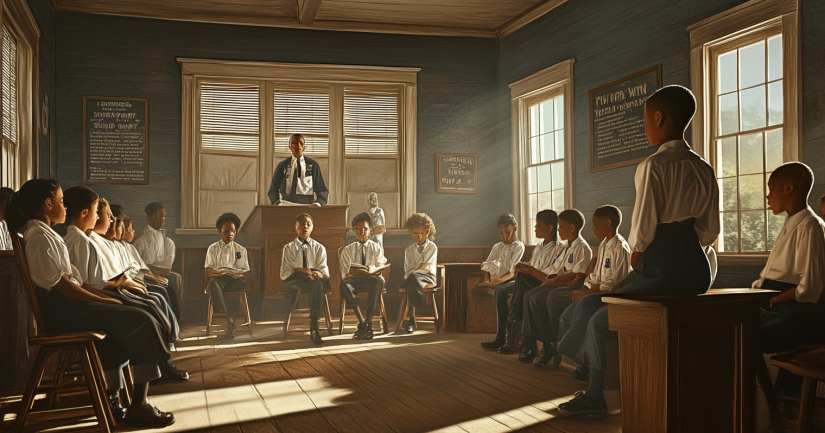
Science is on trial, ideas clash, and the courtroom simmers with tension this Inherit The Wind Vocabulary Quiz tests your grasp of the rich and purposeful language used throughout Jerome Lawrence and Robert E. Lee’s powerful play. Whether you’re analyzing themes in class, preparing for an exam, or diving deeper into Wildean wit with a courtroom twist, understanding the vocabulary of Inherit the Wind sharpens your ability to interpret tone, character, and conflict in every scene.
From biblical allusions to legal terminology, the play’s language reflects its dual role as drama and philosophical debate. This quiz invites you to decode words spoken in passion, prayer, or protest because knowing the language of the play means understanding the stakes behind every argument.
Words matter in Inherit the Wind how well do you know the language of the play? If you enjoyed this quiz, put your instincts to the test with the Inherit The Wind True Or False Quiz to challenge common misconceptions. Then, test your memory of iconic lines with the Inherit The Wind Quote Identification Quiz. And for the biggest challenge of them all, try the Inherit The Wind Full Book Quiz to see how well you remember the entire play!
Take On the Inherit The Wind Vocabulary Quiz
What This Inherit The Wind Vocabulary Quiz Covers
You’ll explore words drawn directly from the script, character dialogue, and courtroom rhetoric. This includes:
- Legal terms used in the trial scenes (e.g. objection, testimony, verdict, infringe)
- Religious vocabulary linked to sermons and belief (e.g. heretic, damnation, salvation, blasphemy)
- Descriptive words that reveal character emotion or tone (e.g. pompous, dogged, defiant, timid)
- Figurative language that deepens meaning (e.g. inherit the wind, Golden Dancer)
- Literary and symbolic terms that support analysis (e.g. allusion, metaphor, foreshadowing, allegory)
Questions may ask you to define terms, identify synonyms, match words to characters, or choose the word that best fits a given quote or context.
Examples of Vocabulary in Context
You’ll be tested on how well you understand words such as:
- Agnostic – As used by Drummond to describe belief without certainty
- Obsolete – When Brady argues that evolution undermines faith
- Reverent – To describe Rachel’s initial view of her father’s teachings
- Irrelevant – As the judge dismisses expert scientific testimony
- Fanaticism – Embodied by Reverend Brown’s fire-and-brimstone sermons
- Inherit – In the biblical warning, “He that troubleth his own house shall inherit the wind”
- Contempt – Both in tone and as a legal charge within courtroom proceedings
Each vocabulary term is linked directly to theme, tone, or character, making it essential for literary analysis.
Why This Vocabulary Quiz Enhances Literary Insight
Language is central to Inherit the Wind words are wielded like weapons. This quiz helps you:
- Understand key themes like censorship, progress, and free thought
- Analyze how diction reveals character values and conflicts
- Explore the symbolic power behind terms like “Golden Dancer” and “inherit the wind”
- Strengthen academic writing and test performance with precise vocabulary
The more clearly you understand Wilde and Lawrence’s word choices, the better equipped you are to interpret the play’s meaning.
Fun Facts About Language in the Play
- The title comes from Proverbs 11:29, warning about the cost of troubling your own beliefs or family
- “Golden Dancer,” Drummond’s story about a toy horse, is a metaphor for empty appearances
- Hornbeck’s language is often sardonic and elitist, using irony to provoke the audience
- Brady’s speeches are modeled after real revival-style oratory—flamboyant and righteous
- The courtroom setting allows characters to use rhetoric, persuasion, and cross-examination as dramatic tools
Who Should Take This Quiz
This quiz is ideal for:
- Students preparing for literature exams or essay assignments
- Teachers crafting vocabulary lessons tied to literary texts
- Actors analyzing character dialogue for tone and meaning
- Readers looking to better understand courtroom language and religious symbolism
- Anyone exploring the crossroads of law, faith, and language in classic American drama
It works equally well for first-time readers and experienced analyzers.
Speak the Language of Belief, Doubt, and Debate
Every word in Inherit the Wind carries weight whether spoken in protest, prayer, or persuasion. This Vocabulary Quiz gives you the chance to test your knowledge, sharpen your language, and uncover the deeper meanings behind the play’s most powerful dialogue.
Take the quiz now and see how fluently you understand the language of liberty, law, and the right to think.
Inherit The Wind Quizzes: Analyze the classic courtroom drama …
Inherit The Wind Vocabulary – FAQ
The title Inherit the Wind is a biblical allusion to Proverbs 11:29, which states, He that troubleth his own house shall inherit the wind. This suggests that those who create conflict or disrupt harmony may end up with nothing, reflecting the play’s themes of intellectual and moral challenges.
The main characters include Henry Drummond, a defense attorney representing the accused teacher, Bertram Cates, who is on trial for teaching evolution. Matthew Harrison Brady is the prosecuting attorney and a staunch supporter of creationism. These characters symbolize the broader conflict between science and religion.
The play centers around the trial of Bertram Cates, a schoolteacher accused of violating a law by teaching evolution. This legal battle serves as a metaphor for the larger societal conflict between scientific progress and traditional beliefs, highlighting themes of intellectual freedom and the right to think.
Inherit the Wind champions the idea of intellectual freedom by dramatizing the struggle between adhering to established norms and exploring new ideas. Through the courtroom battle, the play advocates for the right to question and challenge prevailing ideologies, emphasizing the importance of open-mindedness and critical thinking.
Despite being set in the 1920s, Inherit the Wind remains pertinent as it addresses enduring debates over science, religion, and education. Its exploration of the tension between progress and tradition continues to resonate, reminding audiences of the ongoing need to defend intellectual freedom and encourage dialogue on contentious issues.
